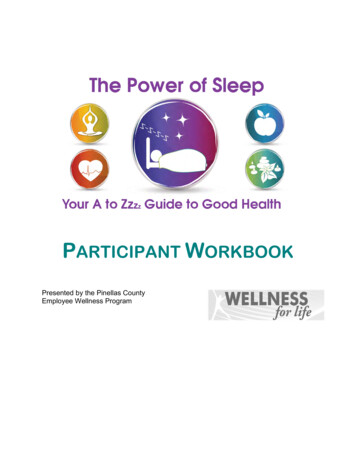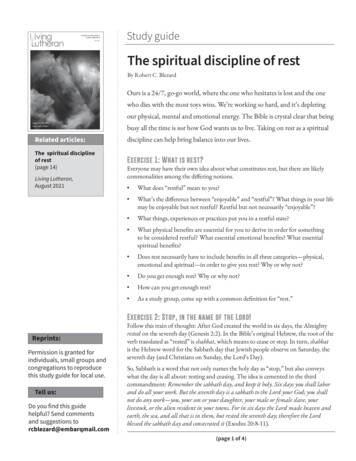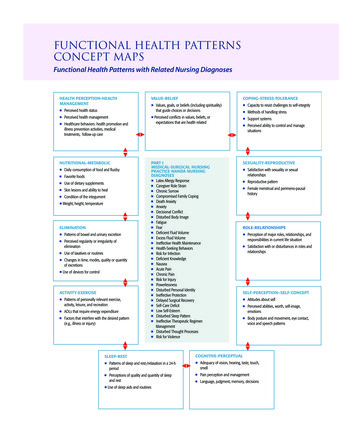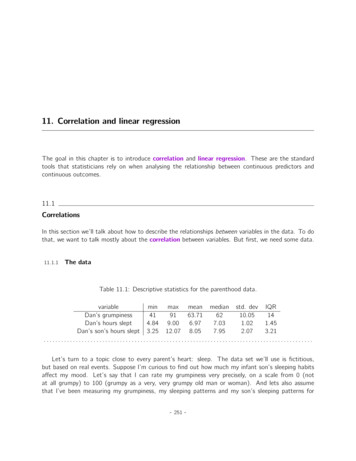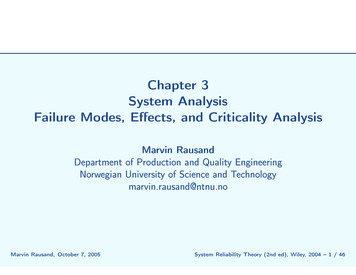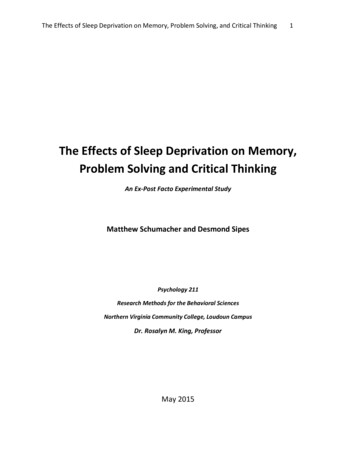
Transcription
The Effects of Sleep Deprivation on Memory, Problem Solving, and Critical Thinking1The Effects of Sleep Deprivation on Memory,Problem Solving and Critical ThinkingAn Ex-Post Facto Experimental StudyMatthew Schumacher and Desmond SipesPsychology 211Research Methods for the Behavioral SciencesNorthern Virginia Community College, Loudoun CampusDr. Rosalyn M. King, ProfessorMay 2015
The Effects of Sleep Deprivation on Memory, Problem Solving, and Critical Thinking2ABSTRACTThe main focus of this research was to obtain a deeper insight of the negativeimplications sleep deprivation had on particular cognitive functions. The researchaimed to assess the correlation, if any, sleep deprivation had on critical thinking,problem solving skills, and short-term memory of college students. The purposewas to gain new information, which would better inform college students of theimportance of routinely obtaining the recommended 7-8 hours of sleep. Themethod applied in this research was a simple ex post facto design model alongwith simple stratified random sampling. The stratum was separated in to twostrata of twenty-five male and females per for a total sample size of fifty. Theexperiment took place on the Loudoun campus of Northern Virginia CommunityCollege.The instrumentation used was a Cognitive Function AbilitiesAssessment. The data failed to support the hypothesis in this experiment. Thedata supports a conclusion, which makes determining any correlation difficult;however, by accounting for limitations not accounted for initially, better resultscould be obtained upon conducting the experiment a second time.
The Effects of Sleep Deprivation on Memory, Problem Solving, and Critical Thinking3TABLE OF CONTENTSAbstract . . .2List of Figures . . .5Chapter One INTRODUCTION . .6 Background Problem Statement Purpose of the Study Major Research Question Minor Questions Hypothesis Theoretical Framework Significance of Study Definition of Terms Delimitations of Study Limitations of StudyChapter Two LITERATURE REVIEW .12 Overview Overview of Research Question Overview of Literature Causes of Sleep Deprivation Effect on Memory, Problem Solving, and Critical Thinking Overcoming Sleep Deprivation Research Methodologies and Evaluation of Research Designs SummaryChapter Three RESEARCH DESIGN AND METHODOLOGY . .19 Introduction Overview of Research Design Sampling Design Data Collection Data Analysis Procedures
The Effects of Sleep Deprivation on Memory, Problem Solving, and Critical Thinking Precautions Taken to Ensure Data Validity and Reliability Limitation of the Research Expected Findings Ethical Consideration Conclusion4Chapter Four DATA ANALYSIS AND DISCUSSION . .26 Overview of Data Analysis Discussion Limitations Discovered Post Experiment Future ResearchChapter Five CONCLUSION. . . .41 Gaps in Understandings and the Research Summary of Key Findings Implications and Recommendations for Further StudyReferences . 43Appendices . .45Appendix A: Informed Consent FormAppendix B: Cognitive Function Abilities AssessmentAppendix C: Cognitive Function Abilities Assessment Answer Key
The Effects of Sleep Deprivation on Memory, Problem Solving, and Critical Thinking5List of Figures3.1: Simple Ex Post Facto Design Diagram .203.2: Informed Consent Document Template .463.3: Cognitive Function Abilities Assessment .483.4: Cognitive Function Abilities Assessment Answer Key . 544.1: Bar Graph of Male Student’s Test Scores Compared to Number of Hours of Sleep 264.2: Bar Graph Female Student’s Test Scores Compared to Number of Hours of Sleep .274.3: Bar Graph of Average Test Scores Comparing Male Students to Female Students .284.4: Bar Graph of Average Number of Hours of Sleep Based on Age Comparing Males to Females .294.5: Correlation Charts of Hours of Sleep Compared to Critical Thinking Test Scores for Males and Females .304.6: Correlation Chart of Hours of Sleep Compared to Critical Thinking Test Scores for All Participants .314.7: Correlation Charts of Hours of Sleep Compared to Problem Solving Test Scores for Males and Females .324.8: Correlation Charts of Hours of Sleep Compared to Problem Solving Test Scores for All Participants .334.9: Correlation Charts of Hours of Sleep Compared to Memory Test Scores for Males and Females .344.10: Correlation Charts of Hours of Sleep Compared to Memory Test Scores for All Participants .35
The Effects of Sleep Deprivation on Memory, Problem Solving, and Critical Thinking6Chapter 1INTRODUCTIONSleep is an essential element of the human condition, which allows us to, when obtaining thecorrect amount, perform critical daily functions at peak optimization. However, the community at largeoften underestimates sleep and its importance, therefore leading people to not be as concerned with aproper night’s sleep, thereby preventing them from performing at peak efficiency.BackgroundSleep is a normal human function that is detrimental to sustaining life yet; individuals areaffected differently by their sleep schedule. There is no doubt that in today’s modern world collegestudents are busy individuals. Whether from the grueling demands of regularly assigned homeworkcoupled with major projects assigned from a full schedule of classes, or the boss asking them to “stay forjust a few hours longer,” they are stretched thin. Sleep is a detrimental necessity that when not enoughis obtained, a noticeable depreciation in the daily functioning of the sleep-deprived individual(s) canhave a detrimental impact on the adequate performance of certain critical daily functions.When an individual routinely has poor sleep habits paired with sleep loss can have a negativeimpact on one’s health. Sleep is important because it has a determining role in your mental and physicalhealth, along with quality of life (“How Much Sleep is Enough”, 2012). However, regardless of the reasonfor one to not receive the proper amount of sleep it is imperative that individuals, especially collegestudents receive the proper amount in order to avoid depreciation in their ability to problem-solve,think critically and remember adequately.
The Effects of Sleep Deprivation on Memory, Problem Solving, and Critical Thinking7Problem StatementEverywhere you go, you hear people complain that they are tired and do not have any energy.Students stay up late because they had to work the night before in order to pay for school, they aretrying to finish an assignment that is due the next day, there is some sort of issue at home, or theydecided they would rather do some other leisure activity they enjoy rather than go to bed at a moreappropriate time. However, studies have shown that sleeping is one of the most important things aperson can do. Sleep plays a vital role in learning and when a person fails to obtain enough sleep thenight prior, neurons in the brain might not fire properly, the body becomes out of synch, and it can evenlead to accidental physical injuries (“Benefits of Sleep”, 2007).Students need to learn to be able to put down their computers, turn off the TV, say no to a nighton the town, or limit some of their work hours so that they can ensure themselves at least the minimumnumber hours of sleep required. Perhaps teachers will even notice a noticeable difference in studentperformance if all of their students are receiving the appropriate amount of sleep every night.Purpose of this StudyThe purpose of this study is to enlighten the community at large of the adverse effects that alack of sleep can have on the human mind. This study will also provide insight as to how much sleep isnecessary each night for adults and the maximum number of hours a person should remain awakebefore going to sleep. The data gathered would help people to create a new sleep pattern that willguarantee peak performance.Major Research QuestionHow does a lack of sleep impact memory, problem solving and critical thinking skills amongstcollege students?
The Effects of Sleep Deprivation on Memory, Problem Solving, and Critical Thinking8Minor Questions What are the differences between genders? What age group will be most affected by sleep deprivation? Is there a point where the skills stagnate after a certain number of hours of sleep?HypothesisCollege students that obtain between seven to eight hours of sleep each night will achievehigher scores on the tests administered than those who receive six or less, or nine or more hours ofsleep per night.Theoretical FrameworkPeople claim to understand that sleep is an important aspect of their life, yet they prove theirignorance by refusing to get sleep, even when they are tired, because they want to get though one morelevel in a game, read one more chapter, watch one more episode, or have “just a little more work toaccomplish.” Studies have determined that total sleep deprivation negatively effects an individual’sfiltering capabilities. Though their visual working memory capacity is left unhindered, if one cannot filterout the information being taken in, they cannot store anything in their memory (Drummond, Anderson,Straus, Vogel, & Perez, 2012).Many people tend to allow themselves to be sleep deprived throughout the week because theygenerally believe they can make up for the sleep on the weekend when they get a break from the workor school week; however, during the period of sleep deprivation, their ability to complete tasks will behindered, causing a decrease in the quality of work primarily due to a reduction in attention, memory,and problem solving tasks (Chiang, Arendt, Zheng, & Hanisch, 2014).
The Effects of Sleep Deprivation on Memory, Problem Solving, and Critical Thinking9As studies have been conducted, the majority have seemed to come to similar conclusions: alack of sleep can have detrimental side effects on the human mind and body, and by regularly obtainingenough sleep each night, a person can function more efficiently. As a person becomes more sleepdeprived, their attention span shortens and their working memory begins to deteriorate (McCubbin,Peach, Moore, & Pilcher, 2012). It can then be easily concluded that as these skills decline, the quality ofwork will do the same, which is contrary to the mindset of a majority of college students today.Especially during the time of midterm and final exams, and when project deadlines loomoverhead, a common behavioral pattern becomes apparent in most, if not all, students. Sleep issacrificed in order to allow them to continue their work or studying, attempting to finish their work ontime or memorize everything they need to in order to secure a good grade. However, if the past studiesand the results are accurate, these students could be setting themselves up for failure, or at leastkeeping themselves from achieving the highest grade possible, while simultaneously negatively affectingtheir health.In all actuality, when otherwise healthy students deprive themselves of sleep, there is analteration in the neurophysiological and endocrine systems, rendering all learned and practiced eventsduring the period of sleep deprivation moot. It can be determined that this is likely due to a decrease invigilance and maintained attention (Klumpers, Veltman, van Tol, Kloet, Boellaard, Lammertsma, &Hoogendijk, 2015).Significance of StudyThis study will prove to be of significance by determining the optimum number of hoursrequired for individuals to be able to perform at their peak efficiency. As people enter different stages oflife, they become preoccupied with different activities and interests that end up taking up their time andfocus. Some are at a point where they are in school, pursuing their education, while others are in the
The Effects of Sleep Deprivation on Memory, Problem Solving, and Critical Thinking10workforce, some are raising children and others spend their time engaging in different hobbies andpleasurable actives, and many are doing any combination of these things.Unfortunately, people get so distracted with their activities and attempting to do everythingthat they want and need to do, their sleep cycles suffer. Sometimes it is unintentional, people getcompletely preoccupied and they lose track of time. On other occasions, they purposefully forcethemselves to remain awake because there is something they want or feel they need to do, so they loseeven more sleep that night. There are times when a lack of sleep is to be expected; for instance whenparents are raising an infant. Never the less, people still do not make sleep enough of a priority.It is the desire of the researchers in this study to educate the community of the true importanceof getting enough sleep. By showing them the difference that a proper night’s sleep can have comparedto a night without the proper amount; hopefully people will then make an effort to ensure that they getenough sleep to be able to function efficiently each day.Definition of TermsSleep: The naturally recurring (esp. nightly) condition of repose and inactivity assumed by people andmost higher animals, in which consciousness, response to external stimuli, and voluntarymuscular action are largely suspended.Adult: All individuals that are 18 years of age or olderMemory: The faculty by which information is remembered; the capacity for retaining, perpetuating, orreviving the thought of things past; an individual’s faculty for remembering information.Problem Solving: A person’s ability to be confronted with mathematical word problems and solve themto find the correct answer.
The Effects of Sleep Deprivation on Memory, Problem Solving, and Critical Thinking11Confidence Interval: A range of values so defined that there is a specified probability that the value of aparameter lies within it.Critical Thinking: The individual’s ability to think logically and answer questions with obvious yet trickanswers.Circadian Rhythm: The cycle of biological activity based on a 24-hour period of time and is influenced bythe regular variations in the environmentStandard Deviation: a quantity calculated to indicate the extent of deviation for a group as a wholeFatigue: A condition of muscles, organs, cells, or materials characterized by temporary reduction inpower, efficiency or sensitivity following prolonged use or activity.(Shorter Oxford English Dictionary, Fifth Edition, 2002)Delimitations of Study Study is based at the Loudoun Campus of Northern Virginia Community College Students in this study are eighteen years of age or older All subjects receive the exact same testLimitations of Study Some participants might provide inaccurate information Some participants might not put in true effort when completing the tests No equipment to test the full extent to which the brain is functioning
The Effects of Sleep Deprivation on Memory, Problem Solving, and Critical Thinking12Chapter 2LITERATURE REVIEWOverviewSleep is a major aspect in our everyday lives; however, fewer people are getting enough sleepeach night and more are slowly becoming sleep deprived. Sleep deprivation is defined as a conditionthat occurs when an individual does not get enough sleep each night (What Are Sleep Deprivation,2012). There is an immense amount of research being conducted in order to determine how toovercome sleep deprivation, but in order to surpass any issue, it is important to know who is at risk ofbeing afflicted by it.It is important to understand that people of all ages, and ethnicities are at risk of becomingsleep deprived. More specifically, individuals who have limited time for sleep, such as students, peoplewho work a lot of hours either at either one or more jobs, as well as caregivers. Also, those who haveschedules that conflict with circadian rhythms such as; shift workers, first responders and individualswho travel for work can also be at risk of suffering from sleep deprivation. Other individuals that couldbe included would be those whose life style choices do not allow them to receive adequate amounts ofsleep such as; individuals who take medication to stay awake, those who abuse alcohol and or drugs, orthose who don’t place sleep high on their priority list. Individuals who suffer from various medicalconditions such as heart failure, heart disease, obesity, high blood pressure, diabetes, stroke, transitischemic attack (mini stroke), attention-deficit hyperactivity disorder, and depression can all suffer fromsleep deprivation as well (Who is at Risk, 2014)So many people fail to maintain a proper sleep schedule, but sleep is one of the most importantaspects of mankind’s everyday life. There are several important aspects to maintaining an adequate
The Effects of Sleep Deprivation on Memory, Problem Solving, and Critical Thinking13amount of sleep on a nightly basis. These would include: committing new information to memory,maintaining normal body processes such as proper carbohydrate storage and maintaining properhormone levels, reduced tendency for day time sleepiness, thereby reducing human errors such asmedical mistakes and traffic accidents, reduction in irritability and patience, improves concentration andreduces moodiness and laziness. Sleep disorders have been linked with hypertension, irregularheartbeat, and increased cortisol levels, while an adequate amount of sleep assists in maintainingproper immune system function (Benefits of Sleep, 2015).Overview of Research QuestionIt is the desire of a majority of research in the field of sleep deprivation to determine what theoptimum amount of sleep is for each person. This would be determined by the efficiency of a person’smemory, problem solving and critical thinking skills after a night of sleep. It is important to understandwhat might keep an individual awake at night in order to be able to avoid these obstructions in thefuture. The subject is constantly explored and the consensus is that seven to eight hours of sleep is theoptimum amount, but it is the desire of the researchers of this study to confirm these conclusions, whilealso aiming to determine at which point, if any, when sleep becomes redundant or a hindrance andconversely negatively impacts everyday functions.Overview of LiteratureThe purpose of this study is to determine the efficacy of sleep and the adverse effects of failingto receive the proper amount on a consistent basis. The varying articles and studies have all appeared tocome to a complementary consensus on the importance of a consistent sleep cycle, which allows forseven to eight hours of sleep. Many studies have been conducted within recent years, all of which seemto use a wide array of different procedures. While at the same time accumulating a plethora of data on
The Effects of Sleep Deprivation on Memory, Problem Solving, and Critical Thinking14the subject matter showing sleep’s benefits and the adversities that can arise from not receiving enoughon a consistent basis.Causes of Sleep DeprivationJust like other problems that humanity faces, there is not a single cause for sleep deprivation. Ifa person suffers from a sleep disorder, it is very likely that the individual will become sleep deprived, theissue is determining which disorder the person suffers from so that help can be sought after to assist inreceiving enough sleep. People have been known to suffer from insomnia, sleep terror disorder,narcolepsy, sleep walking, and sleep apnea; these are just a few of the many disorders that individualscan suffer from, which can prevent them from achieving an optimum sleep regimen each night aswitnessed by researchers Murphy and Delanty (Murphy, & Delanty, 2007).Along with officially diagnosable sleep disorders, it has been observed through empirical studiessuch as Hershner and Chervin’s Causes and Consequences of Sleepiness Among College Students thatschedules set by colleges and public schools are partially responsible for students being afflicted withsleep deprivation. With class times being set early in the morning and late in the evening as well aswork-loads being increased outside of the class room, individuals’ circadian rhythms can becomediscombobulated, causing them to have an inadequate sleep cycle (Hershner, & Chervin, 2014).The third major factor that can lead to an insufficient amount of sleep is when an individualmakes personal and professional commitments beyond that of what is reasonably accomplished.Different careers can lead individuals to go extended periods of time without adequate amounts ofsleep each night, for example; medical professionals and shift workers. When said individuals do finallyhave the opportunity to go home and rest, they still have to deal with the demands of their socioeconomic factors such as raising a family and environmental noise pollution (Murphy, & Delanty, 2007).
The Effects of Sleep Deprivation on Memory, Problem Solving, and Critical Thinking15Effect on Memory, Problem Solving, and Critical ThinkingBy failing to obtain an efficient amount of sleep each night, there is an increased possibility ofthere being one or more adverse effects on the individual’s cognitive capabilities. The actual ability tostore information is not completely hindered when a person is suffering from total sleep deprivation;however, when a person is suffering from a lack of sleep, they may tend to lose the ability to filterinformation; therefore, storing more irrelevant information into their working memory, leaving lessroom for that which is relevant, making it appear that the memory itself is being hindered. This wasclearly observed through the empirical research study titled: The Effects of Two Types of SleepDeprivation on Visual Working Memory Capacity and Filtering Efficiency, which was conducted byresearchers Drummond, Anderson, Straus, Vogel, & Perez (Drummond, Anderson, Straus, Vogel, &Perez, 2012).Sleep loss has been shown to be inversely proportional to academic performance; when onefails to receive an adequate amount of sleep on a nightly basis, the literature states that an individual’sskills in learning capacity, such as memory, attention and problem solving skills are effected the most.Sleep deprivation can also lead to daytime sleepiness. When these factors are all being faced, studentsare likely to achieve lower test scores and lower grade point averages; however, it has been shown thatcognitive function is not hindered as drastically when the individuals are working in groups as whenworking alone (Chiang, Arendt, Zheng, & Hanisch, 2014)An individual’s physical and mental health and abilities have been shown to have directcorrelation with sleep deprivation. Research has shown that people who suffer from sleep deprivation,are more likely to have issues with their cognitive abilities, such as memory and problem solving skillswhen the individual also suffers from hypertension, but the relationship does not end there. Theempirical research study Decreased Cognitive/CNS Function in Young Adults at Risk for Hypertension:
The Effects of Sleep Deprivation on Memory, Problem Solving, and Critical Thinking16Effects of Sleep Deprivation, which was conducted by researchers; McCubbin, Peach, Moore & Pilcherhave also shown that individuals who do not have hypertension are more likely to develop this issuewhen constantly depriving themselves of sleep (McCubbin, Peach, Moore, & Pilcher, 2012).The brain is most effectively influenced by the different chemicals that are naturally released bythe body, but it is very possible to disorient the brain by not releasing, or releasing too much of, acertain chemical. The empirical research study Neurophysiological Effects of Sleep Deprivation in HealthyAdults, has shown that people suffering from total sleep deprivation have an increase in dopamineoutput and a decrease in cortisol, thereby requiring an increase in a combined effort of production fromthe prefrontal and limbic cortical regions. Despite the increase of activity in the brain, individuals stillsuffer from decreased cognitive performance (Klumpers, Veltman, van Tol, Kloet, Boellaard,Lammerrtsma, & Hoodendijk, 2015).Overcoming Sleep DeprivationThere are multiple ways in which individuals can work to overcome their sleep deprivation andreturn to functioning at an appropriate efficiency. Insomnia has been shown to be a lead cause in sleepdeprivation, causing individuals to lie awake at night, unable to achieve sleep, or constantly wakingthroughout the night, there are multiple treatments that have been tested and of these, one seems tostand out. With all the different drugs being used to aid with sleep, acupuncture is actually proving to bean effective aid and more research is going into discovering the true potential of this treatment (YuanFang, Jian-Hua, Neng-Gui, Zhao-Hui, Zhen-Hua, Shu-Jun, & Wen-Bin, 2013).Another aid in the fight against sleep deprivation is natural sleep aids. It is remarkable howmany natural aids there are, most of which come from leaves, roots and tree bark. Some of these aidsinclude: kava-kava, which is an herbal remedy that relaxes the body and enhances dreaming. Valerianroot, which eases nerve and muscle tension as well as relieves anxiety and chamomile, which is a flower
The Effects of Sleep Deprivation on Memory, Problem Solving, and Critical Thinking17that is most often drunk as a tea, aids in reducing restlessness and digestion. There are a plethora ofnatural remedies that help with releasing Melatonin and Tryptophan, which are natural chemicals in thebody that aid in healthy sleep. One should always choose a natural remedy over its syntheticcounterpart when available (Kopparapu, Puranik, Nargund, Samuel, Shahapurkar, & Mathew, 2012).A full night of sleep is not always an option with people’s nonstop lives, so the majority ofpeople turn to different stimulants in order to keep them going during the day. Studies have shown thatwhen 20mg of d-amphetamines are ingested orally, the individual returns to a cognitive state that waspresent prior to being sleep deprived, allowing for an improvement in addition and subtraction as wellas logical reasoning tasks. Amphetamines also reduce a person’s response bias by increasing theirconfidence in their actions and decisions. It has long been believed that nicotine has the ability to aid inthe retention and enhancement of cognitive functions, when the individual is sleep deprived, due to thefact that it is a stimulant, but research has actually shown it has no positive effect on the brain’scognitive capabilities, due to its inability to improve sleep latency. L-deprenyl, like nicotine, fails toimprove sleep latency in sleep-deprived individuals thereby negating any improvements on cognitiveperformance during the sleep deprivation period. These findings were discovered in the empiricalresearch of Stimulant Drug Effects on Performance and Behavior After Prolonged Sleep Deprivation: AComparison of Amphetamine, Nicotine, and Deprenyl (Newhouse, Penetar, Fertig, Thorne, Sing, Thomas,& Belenky, 1992).Research Methodologies and Evaluation of Research DesignsFrom the literature reviewed prior to conducting this research experiment, these researcherscame to the conclusion that multiple types of methodologies and designs have been used in the variousstudies of sleep deprivation reviewed. Some researchers have used methods which primarily studied thedeterioration of the individual’s cognitive abilities as they become deprived of sleep. As others
The Effects of Sleep Deprivation on Memory, Problem Solving, and Critical Thinking18compared those who were sleep deprived to those where were well rested. Multiple researchers inorder to screen for general intellect and testability used tests such as the Peabody Picture Vocabularytest and the Raven’s Progressive Matrices. The majority of the prior experiments reviewed for this studytend share a balance in being both quantitative, hours of sleep, and qualitative, the individuals cognitiveabilities. Overall, the consensus amongst the researchers of the studies reviewed for this experiment,was that the preferred method of data collection was by direct observation in a laboratory environment,complete with EEG, EMG, fMRI and the like. This would include observers, inspectors, scientific researchand data logging each performing a particular piece of the research puzzle.SummaryThe focus of this study is to inform students and possibly individuals in the work force of theimportance of receiving the recommended 7-8 hours of sleep each night and what the possible negativeeffects are when sleep is neglected. If individuals are to function at full functional capacity, it isimperative they receive the optimum amount of sleep on a continuous basis.
The Effects of Sleep Deprivation on Memory, Problem Solving, and Critical Thinking19Chapter 3RESEARCH DESIGN AND METHODOLOGYIntroductionThe purpose of this study is to gain a better understanding in to the detrimental effects, whichsleep deprivation can have on memory, problem solving and, or critical thinking skills among collegestudents. As college students today, schedule demands are becoming more vigorous while free time isdiminishing. Whether because of demands from classes, homework assignments, or having a job, lesspriority is being given to health. Especially when associated with routinely obtaining the recommendedseven to eight hours of sleep, it becomes imperative that students ensure they get the proper amount
The Effects of Sleep Deprivation on Memory, Problem Solving, and Critical Thinking 6 Chapter 1 INTRODUCTION Sleep is an essential element of the human condition, which allows us to, when obtaining the correct amount, perform critical daily functi

